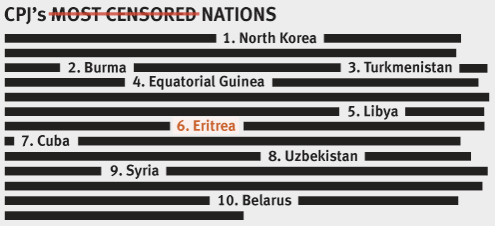No independent press has operated in this Red Sea nation since a September 2001 government crackdown on dissent that led to the imprisonment of 11 leading journalists without charge or trial and the enforced closure of their publications. President Isaias Afewerki’s administration consistently refused to account for the whereabouts, legal status, or health of the jailed journalists, or even confirm reports that some had died in custody. All of the journalists were held without access to their families or lawyers. The only media allowed to operate in the country were under the control of Information Minister Ali Abdu, who enforced rigid control of information and ideas through intimidation and imprisonment. Even state media journalists braved border guards’ shoot-to-kill orders to escape the country. Government agents abroad harassed and intimidated media outlets established by exiled journalists. The government’s egregious actions drew condemnation from the European Parliament in September 2011, the latest in a series of international censures.
Eritrea
» For 10 consecutive years, nation is the leading jailer of journalists in Africa.
» Using ruthless tactics, state maintains absolute control over news coverage.
No independent press has operated in this Red Sea nation since a September 2001 government crackdown on dissent that led to the imprisonment of 11 leading journalists without charge or trial and the enforced closure of their publications. President Isaias Afewerki’s administration consistently refused to account for the whereabouts, legal status, or health of the jailed journalists, or even confirm reports that some had died in custody. All of the journalists were held without access to their families or lawyers. The only media allowed to operate in the country were under the control of Information Minister Ali Abdu, who enforced rigid control of information and ideas through intimidation and imprisonment. Even state media journalists braved border guards’ shoot-to-kill orders to escape the country. Government agents abroad harassed and intimidated media outlets established by exiled journalists. The government’s egregious actions drew condemnation from the European Parliament in September 2011, the latest in a series of international censures.
-
6th
Most censored nation -
28
Imprisoned as of December 1, 2011 -
0
Independent news media -
47
In exile, 2001-11 -
3,751
Days Dawit Isaac imprisoned
CPJ ranked Eritrea as one of the most censored nations in the world in a 2006 survey. The government's ruthless repression has shielded its leaders from scrutiny.

Eritrea is Africa's leading jailer of the press and the second worst worldwide, trailing only Iran, according to CPJ research.
World's worst jailers in 2011:
Iran: 42
Eritrea: 28
China: 27
Burma: 12
Vietnam: 9
All print, television, and radio news outlets were directly controlled by the government, CPJ research shows. The government's control over the flow of information was near-total.
0
Correspondents for international media0
Locally hosted independent news websites0
Independent newspapers, television stations, radio stationsVast repression has driven dozens of journalists out of the country over the past decade, according to a CPJ study. The study takes into account journalists who flee due to work-related persecution, who remain in exile for at least three months, and whose whereabouts and activities are known to CPJ.
68 Somalia
66 Iran
55 Iraq
49 Zimbabwe
47 Eritrea
25 Sri Lanka
20 Colombia
18 Haiti
18 Rwanda
18 Uzbekistan
17 Gambia
As of December 31, 2011, Swedish-Eritrean journalist Dawit Isaac had been held for more than 3,700 days in a secret prison without charge or trial. He was among a group of 11 journalists who were taken into custody in 2001 as part of a widespread crackdown that shut the independent press. Isaac was briefly freed in 2005 only to be placed back in prison within two days.
Timeline in the Isaac case:
September 23, 2001: Arrested in crackdown on dissent.
November 19, 2005: Released, called family in Sweden.
November 21, 2005: Imprisoned again without explanation.
January 11, 2009: News reports said he was hospitalized.
May 2009: Afewerki said Isaac would not be given a trial and that he made a “very big mistake.”
April 2010: Former prison guard said Isaac was in poor health.
August 1, 2010: Senior official accused Isaac of “very serious crimes” but provided no details.
September 2011: European Parliament resolution called for immediate release of Isaac.
